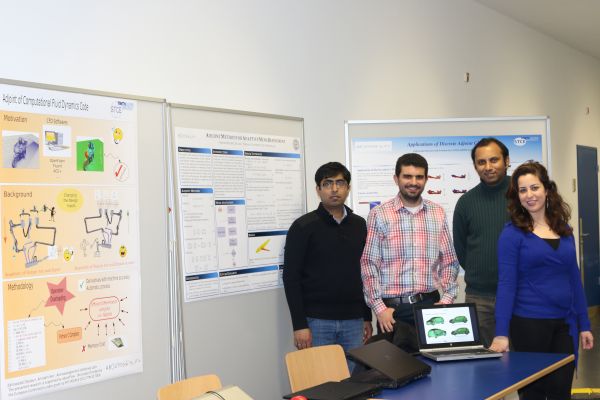Research Fellows
Sheikh Razibul Islam
Early Stage Researcher at WUT

I was born and brought up in Khulna, a southern city of Bangladesh, very close to mangrove forest, Sundarban and the Bay of Bengal. After my Higher Secondary school, I completed my Undergraduate study from BUET which is situated in Dhaka , the capital city of Bangladesh . Immediately after that , I started my career as CAE engineer in Bangladesh. Later on, for postgraduate study I moved to Germany and successfully completed my masters degree in Computational Mechanics from the University of Duisburg-Essen.
I have great interest in people and the history of the world. I like to meet people from all over the world and to know different culture. In my leisure time, I prefer to go out for jogging and photography. However, the fact that AboutFLOW which has encircled a wide variety of international researchers, provides me a great opportunity to discover different ideas and ideals with the fellow co-workers to reach my goal.
The primary objective of my research project is to implement adjoint based optimization techniques for industrial application of unsteady flows. This approach is to be applied on the currently available in-house CFD code flow2. Implementation of the discrete adjoint approach in flow solvers requires rigorous coding process and immense amount of computing time which can be scaled down using automatic differentiation tools, actuating new challenges in this context. My research interest also lies in the efficient parallel computing which is necessary for large industrial problems and its usage on turbo-machinery.
Working as an ESR in a project like AboutFLOW opened up a wide range of facilities and scopes to collaborate with researcher from industry and academia all over the world. I would like to utilize the expertise obtained through this event to contribute originally and substantially for achieving sustainable development.
Objectives:
Extension of the existing mesh adaptation algorithms to the optimisation of unsteady flow cases.
Parallelisation of the method on GPUs,
Application of the one-shot coupling of adaptation and optimisation to large-size test-cases
Contribute to Work Packages
The quality of the numerical simulations largely depends on the discretisation of the domain. Problem of generating mesh uniformly is very expensive for a desired resolution, as inadequate resolution in a seemingly uninteresting area of the domain may have repercussion in important areas that affect the outputs of interest. It is in these situations that goal oriented adaptive methods, which specifically take into account such effects, can pay off, often by a margin that outweighs their nontrivial cost.
The need for adaptation arises from the goal of reducing errors generated by numerical discretization which includes effects of mesh size, polynomial order and time step. Such error is inherent to numerical simulations because of the finite nature of the discrete numerical computation. Discretization error is not only the source of error in computation, but its management tends to be more elusive. In practice, with limited resources, numerical errors are managed by practitioners who are knowledgeable about the assumption and limitation of the models and by best practice guide lines for mesh generation. Most of the time, very experienced practitioners cannot reliably quantify the error in a discrete approximation of a complex flow-field. Additionally, reliance on best practice guidelines is an open-loop solution that leaves unchecked the possibility of large amounts of numerical error for computations on novel configurations.
Methods based on an adjoint analysis, where an adjoint associated with an output is the sensitivity of that output to residuals in the governing equations, help to close the loop in the control of numerical error in two ways. First these methods provide output error estimates, which can be used as types of numerical “error bars” to determine if the engineering output has been computed to sufficient accuracy. Second, the error estimates can be localized, e.g. to elements of the computational mesh, in order to drive an adaptive method that reduces the error. It has been viewed that both of these uses of output-based analysis as improvements in the robustness of the numerical simulations.
My research objective is to obtain an efficient discrete adjoint code based on the in-house solver and make use of that adjoint solution to adapt the mesh. I am currently working on implementation of dco/c++ (algorithmic differentiation tool) in the solver to calculate the sensitivity in order to obtain the output error estimates, which can be used to find numerical error. Estimated error will be used in the adaptation tool for the mesh adaptation afterwards.

The need for CFD, adjoint based topology optimization and mesh adaptation and their methodologies were explained in the event. In my presentation, adjoint based error estimation and mesh adaptation were explained .
The event was interesting in a way that a lot of new ideas from the visitors emerged through interactive discussion.


